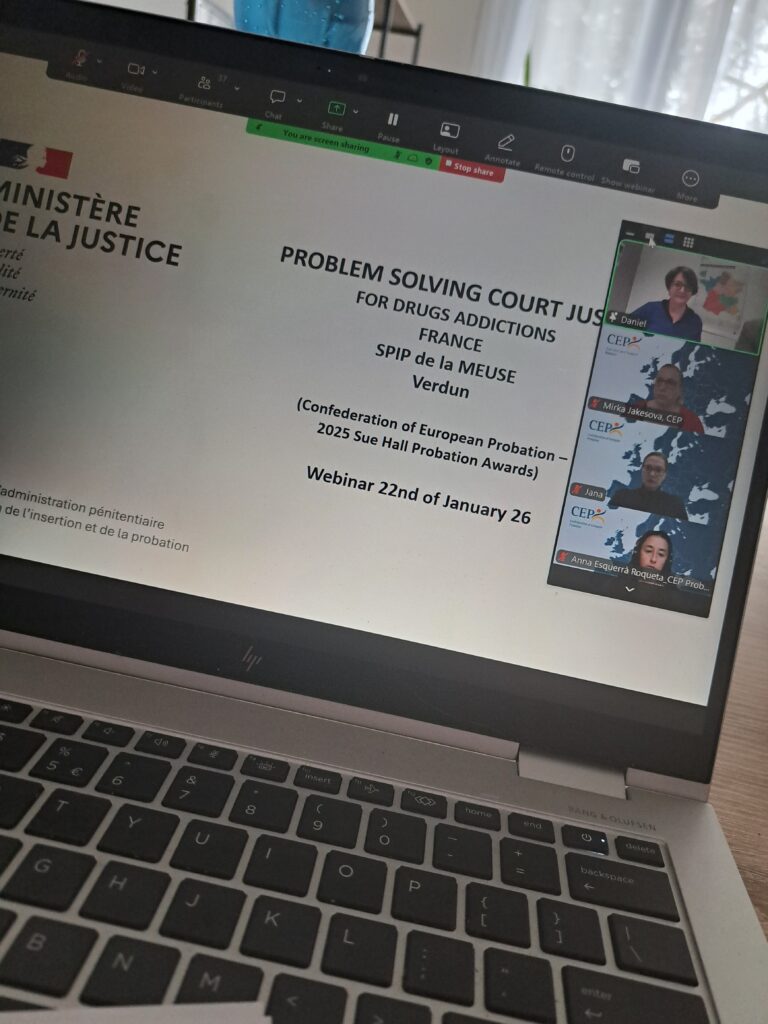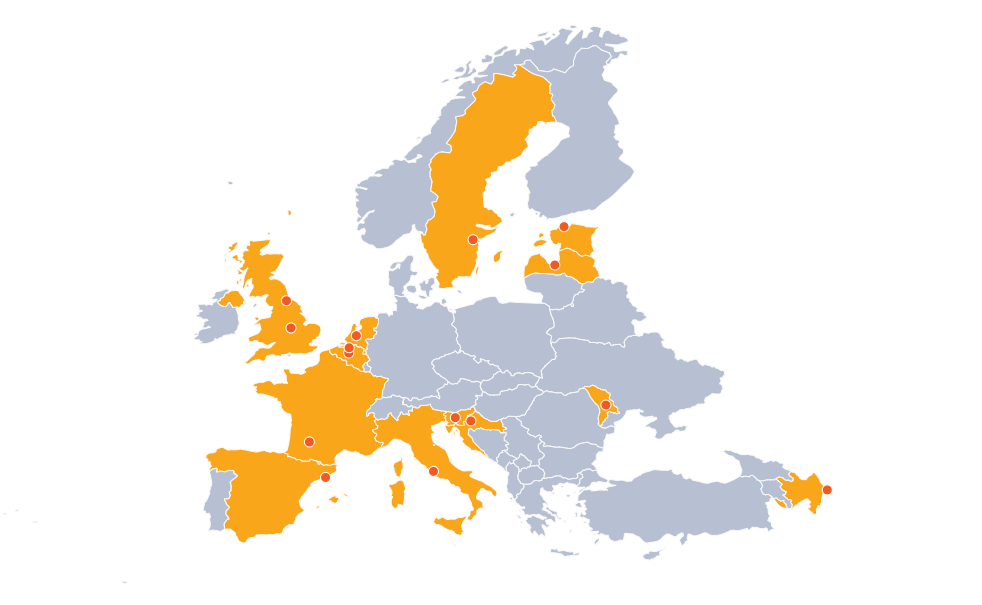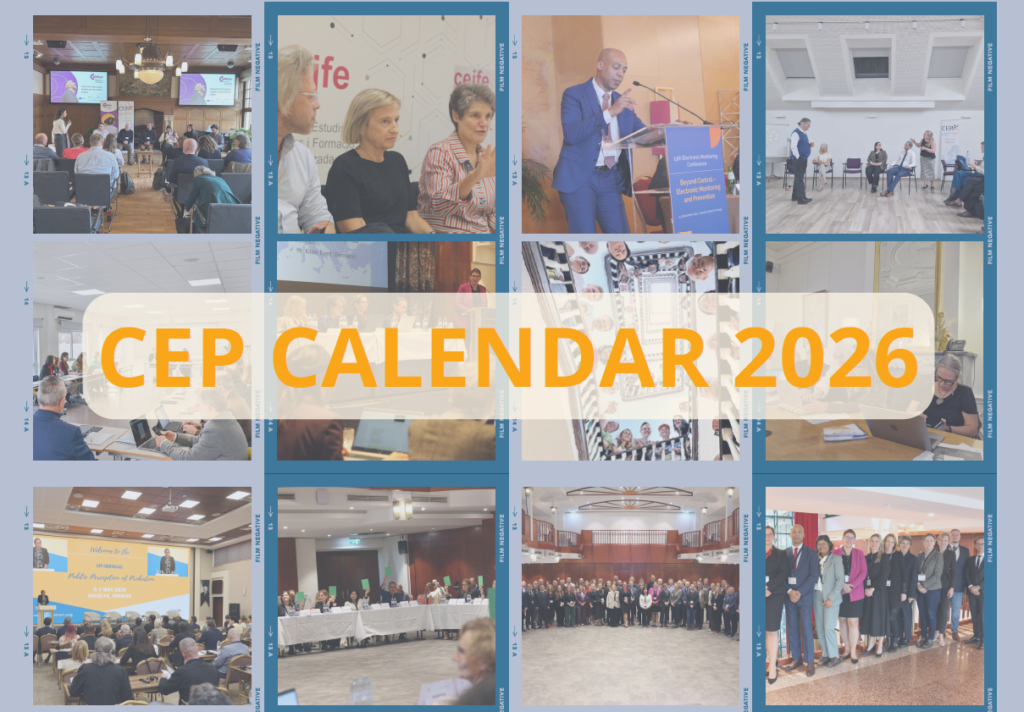Previous Article
News
Recap: CEP Webinar on Radicalisation
On Wednesday 14 June CEP organized a Webinar on Radicalisation gathering experts from three EU jurisdictions – France, the Czech Republic and Bulgaria representing the Council for Penological Cooperation. The webinar brought a focus on the topic of radicalisation from different angles and perspectives highlighting the importance of prevention and early detection as well as the need for continuous improvement of multi-agency cooperation among various stakeholders taking into account the whole-of-society approach, staff training, exchange of information, knowledge and expertise.

More than 40 participants representing probation, prison, universities, courts, police, international organisations and many others from across Europe and the world attended the webinar.
The three presentations were the following:
1) Disengagement and reintegration of radicalised inmates: the French experience
by Julien Loty
The French Directorate of the Penitentiary Administration has developed a strategy to combat violent radicalization in detention in order to meet the security challenges posed by the risk of violence based on a radical ideology and the risk of proselytism likely to be exercised by inmates. This strategy is based on the identification, evaluation and handling of detainees convicted of acts of terrorism or common law offenders suspected of violent radicalization linked to jihadist ideology. This strategy is articulated around dedicated units within prisons for the assessment and handling of these inmates. Trained professionals provide individualized, multidisciplinary intervention to disengage inmates throughout the process. Continuity of management is ensured in the open environment by the penitentiary insertion and probation services and can be reinforced by the Individualized Reception and Social Reaffiliation Program (PAIRS). Four PAIRS centres provide individualized support for people convicted or awaiting trial for acts of terrorism to disengage from radicalization and prevent the risk of violence and reoffending while promoting social reintegration.
Presentation not available.
2) Actual Trends in Radicalization in Online Environment
by Barbora Vegrichtová
The presentation focused on the topics discussed in the virtual environment of the internet and social media with the focus on new trends and potential security threats related to radicalization and inclination to extreme violence. Greater attention was paid to recruitment methods, propaganda tactics, sharing toxic materials and the phenomenon of the copycat effect. Practical examples and concrete cases were integral parts of the presentation. In the end, recommendations for security practices, social work and opportunities for prevention were mentioned.
Presentation not available.
3) Improving international and multi-agency cooperation to tackle radicalization and terrorism
by Nadya Radkovska
The last presentation focused on the improvement of international and multi-agency cooperation to tackle radicalisation and terrorism discussing the international cooperation in the VETOs context, new challenges, promising practices, and opportunities for strengthening multi-agency cooperation.

Related News
Keep up to date with the latest developments, stories, and updates on probation from across Europe and beyond. Find relevant news and insights shaping the field today.
New

Alternatives to pre-trial detention, Community Sanctions and Measures, Framework Decisions, Technology
Future of Criminal Justice: CEP’s Contribution to Key 2025 Dialogues
27/01/2026
Throughout 2025, CEP and its representatives actively participated in the online Technical meetings ahead of the HLF as well as the High Level Forum on Future of Criminal Justice taking place on 4-5 March 2025, 20-21 May 2025 and 1-2 October 2025 in Brussels, Belgium.
Recap

Alternatives to pre-trial detention
Recap: Webinar on Alternatives to Detention 2026
26/01/2026
On Thursday 22 January, CEP hosted the first webinar of 2025 on the topic of Alternatives to Detention. The session led by Ms. Marina Pajoni from the French Prison and Probation Service titled „Problem Solving Justice in Pracitce: The Meuse Probation Service´s Approach to Drug Addiction“ introduced an innovative programme developed by the Meuse Probation Service in close cooperation with the French Ministry of Justice.
New

Education and Training
CEP launches an interactive European map of probation education and training institution contacts
22/01/2026
The CEP is pleased to inform its members that a new dedicated section has been developed on the CEP website featuring an interactive map of Europe.
New

CEP Events
CEP activity calendar 2026
20/01/2026
As we begin the new year, we would like to thank all CEP members, partners, and participants for your continued engagement and valuable contributions. Your involvement plays an essential role in shaping CEP’s work and activities.
We are pleased to share the CEP calendar for 2026, which provides an overview of the events planned for the year ahead. We look forward to continuing our collaboration and welcoming you to upcoming CEP activities throughout the year.
Thank you for being part of the CEP community.
New

CEP members, Gender-based violence
Interventions Alliance’s Eden House Recognized as Outstanding
15/01/2026
CEP is delighted to share that Eden House, an Interventions Alliance residential service for women with high-risk or complex needs on probation, has been rated “Outstanding” overall by HM Inspectorate of Probation. In 2022, Eden House was honored with the CEP Public Protection Award. Our sincere congratulations to the team for this remarkable achievement.
New

Education and Training
The Judicial Training Dashboard
14/01/2026
The European Training Platform (ETP) is a search tool for justice professionals. You can find self-learning materials on a great variety of EU law practice areas and related topics, as well as links to training providers’ homepages and course catalogues.
Subscribe to our bi-monthly email newsletter!
"*" indicates required fields
- Keep up to date with important probation developments and insights.

